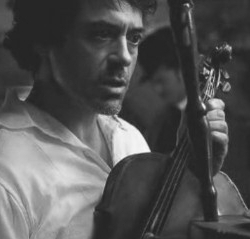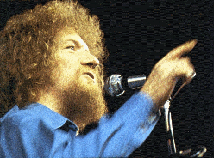FolkWorld Issue 42 07/2010;
Article by Seán Laffey
Folk Music on the Silver Screen (5)
The Rocky Road to Dublin - Sherlock Holmes
The related article has been withdrawn by the author.
Rocky Road to Dublin

The Rocky Road to Dublin
In the merry month of May from me home I started,
left the girls of Tuam nearly broken hearted,
saluted father dear, kissed me darlin' mother,
drank a pint of beer me grief and tears to smother.
Then off to reap the corn, leave where I was born,
cut a stout black-thorn to banish ghosts and goblins,
bought a pair of brogues rattling o'er the bogs
and fright'ning all the dogs on the rocky road to Dublin!
(Chorus): One two three four five, hunt the hare and turn her down
the rocky road and all the ways to Dublin, whack fol la de dah!
In Mullingar that night I rested limbs so weary,
started by daylight next morning light and airy,
took a drop o' the pure to keep me heart from sinking.
That's a Paddy's cure whenever he's on drinking,
they hear the lassies smile, laughing all the while
at me darlin' style, 'twould set your heart a-bubblin',
asked me was I hired, wages I required,
till I was almost tired of the rocky road to Dublin...
In Dublin next arrived I thought it's such a pity
to be so soon deprived a view of that fine city.
So then I took a stroll all among the quality,
me bundle it was stole all in a neat locality.
Something crossed me mind when I looked behind,
no bundle could I find upon me stick a-wobblin'.
Enquirin' of the rogue they said me Connaught brogue
wasn't much in vogue on the rocky road to Dublin...
From there I got away, me spirits never failing,
lan-ded on the quay just as the ship was sailing.
The captain at me roared, said that no room had he.
When I jumped aboard, a cabin found for Paddy.
Down among the pigs played some funny rigs,
danced some hearty jigs, the water round me bubb-lin'.
When off Holyhead wished meself was dead,
or better far instead on the rocky road to Dublin...
The boys of Liverpool, when we safely landed,
called meself a fool, I could no longer stand it.
Blood began to boil, temper I was losing,
poor old Erin's Isle they began abusing.
"Hurrah me soul!", says I, shillelagh I let fly.
Some Galway boys were nigh and saw I was a-hobblin',
with a loud "hur-ray!" joined in the affray.
We quickly cleared the way for the rocky road to Dublin...

|
"Rocky Road to Dublin" is a 19th-century Irish song about a man's experiences as he travels to Liverpool in England from his home in Tuam in Ireland. It is often performed instrumentally.
Origin
The words were written by D. K. Gavan, "The Galway Poet", for the English music hall performer Harry Clifton (1824–1872), who popularised the song.
 The song describes the adventures, troubles and travails that the protagonist encounters on his travels. At the beginning of the songs, the protagonist of the story states that he is "off to reap the corn" meaning he is off to seek his fortune. ("Corn" can refer to any cereal grain, such as wheat or barley, and metaphorically refers to wealth.) He begins his journey by bidding farewell to his family and friends. He leaves his hometown of Tuam, County Galway on foot, and heads east, resting in Mullingar, County Westmeath where he charms the local women with his "curious style" his Galway brogue (accent) and swagger. He next arrives in the capital, Dublin, and decides to tour the city, but is robbed of his meagre possessions. He attempts to locate the thief, but is mocked for his Connacht accent ("Connacht brogue wasn't much in vogue"). He hops a ship in the harbour headed for England, and is placed in the hold with the pigs, where he experiences severe sea sickness off the coast of Holyhead, Wales. He arrives in the English city of Liverpool where he is mocked by the locals because of his nationality. Losing his temper, he engages them in a fight using his blackthorn shillelagh, but is outnumbered until a group of Irishmen from Galway come to his rescue ("join in the affray"), the first people who have helped him on his trip.
The song describes the adventures, troubles and travails that the protagonist encounters on his travels. At the beginning of the songs, the protagonist of the story states that he is "off to reap the corn" meaning he is off to seek his fortune. ("Corn" can refer to any cereal grain, such as wheat or barley, and metaphorically refers to wealth.) He begins his journey by bidding farewell to his family and friends. He leaves his hometown of Tuam, County Galway on foot, and heads east, resting in Mullingar, County Westmeath where he charms the local women with his "curious style" his Galway brogue (accent) and swagger. He next arrives in the capital, Dublin, and decides to tour the city, but is robbed of his meagre possessions. He attempts to locate the thief, but is mocked for his Connacht accent ("Connacht brogue wasn't much in vogue"). He hops a ship in the harbour headed for England, and is placed in the hold with the pigs, where he experiences severe sea sickness off the coast of Holyhead, Wales. He arrives in the English city of Liverpool where he is mocked by the locals because of his nationality. Losing his temper, he engages them in a fight using his blackthorn shillelagh, but is outnumbered until a group of Irishmen from Galway come to his rescue ("join in the affray"), the first people who have helped him on his trip.
Music
The tune uses Dorian mode. It has a typical Irish rhythm, classified as a slip (or hop) jig in 9/8 timing. An extra beat or two between chorus and verse is often added. Sometimes, the final line in the verses is sung with 7 strong musical beats (9
8 + 12
8):
- And frighten all the dogs on the rocky road to Dublin. (every strong musical beat is in bold)
Rather than with 6 strong musical beats (9/8 + 9/8):
- And frighten all the dogs on the rocky road to Dublin.
Lyrics
There are many variations in the lyrics depending on the singer. For instance "June" in the first line is often replaced by "May". Most interpretations of the twentieth century omit the second and antepenultimate verse, and replace the original chorus by the following:
- One two three four five,
- Hunt the hare and turn her down the rocky road
- And all the way to Dublin, whack-fol-la-de-da !
Adaptations
The song is partially recited several times by Mr Deasy in James Joyce's novel Ulysses.
The song serves as the first movement of Peter Graham's composition Gaelforce, which exists in versions for brass band (2000, commissioned by Foden's Band) and concert band (2001). The main theme and chorus are repeated four times, rather than five as in most modern vocal performances.
Recordings
From Wikipedia, the free encyclopedia
[en.wikipedia.org/wiki/Rocky_Road_to_Dublin].
Wikipedia® is a registered trademark of the Wikimedia Foundation, Inc., a non-profit organization.
Text is available under the Creative Commons Attribution-ShareAlike License.
Photo Credits:
(1) Sherlock Holmes
(by Wikipedia);
(2) Robert Downey Jr starring in Sherlock Holmes [2009]
(unknown);
(3) Luke Kelly (unknown).
© The Mollis - Editors
of FolkWorld; Published 07/2010
All material published in FolkWorld is © The
Author via FolkWorld. Storage for private use is allowed and welcome. Reviews
and extracts of up to 200 words may be freely quoted and reproduced, if source
and author are acknowledged. For any other reproduction please ask the Editors
for permission. Although any external links from FolkWorld are chosen with greatest care, FolkWorld and its editors do not take any responsibility for the content of the linked external websites.
FolkWorld - Home of European Music

Layout & Idea of FolkWorld © The Mollis - Editors of FolkWorld


 The song describes the adventures, troubles and travails that the protagonist encounters on his travels. At the beginning of the songs, the protagonist of the story states that he is "off to reap the corn" meaning he is off to seek his fortune. ("Corn" can refer to any cereal grain, such as
The song describes the adventures, troubles and travails that the protagonist encounters on his travels. At the beginning of the songs, the protagonist of the story states that he is "off to reap the corn" meaning he is off to seek his fortune. ("Corn" can refer to any cereal grain, such as 